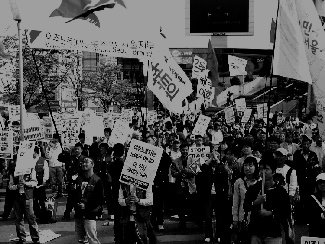Republic of Korea still Still Has HIV related Entry Restrictions!
UN Secretary-General was wrong to applaud!
-Korean HIV/AIDS activists’ response -
4th January 2010, UNAIDS applauded the removal of entry restrictions based on HIV status by Republic of Korea through a press statement. UN Secretary-General Ban Ki-Moon congratulated President Lee Myung-bak’s leadership and called on 57 other countries with the entry restrictions to remove them at the earliest date.
Korean HIV/AIDS activists are concerned that entry restrictions based on HIV status still remain in Korea. There is no reason that the Korean government’s decision should be welcomed by UNAIDS and the UN Secretary-General. The legislations against entry of people living with HIV/AIDS are still present in Korea. The Korean government only revised some parts of administrative instructions.
The press statement of the Ministry of Justice in 6th January 2010 said that the changes in administrative instructions would not mean entire removing restrictions onentry based on HIV status. According to changes of administrative instructions, the Ministry of Justice will restrict re-entry of previously deported people who are defined as "inappropriate to re-entry"by the Ministry for Health, Welfare and Family Affairs. It means that the restriction on entry based on HIV status will remain with no significant revisions.
Koreahas several HIV-specific restrictions on entry and visa applications for residency, immigration and specific types of international employment. Korean government also requires people who apply for certain kinds of visa application such as international employment to indicate their HIV-free status.
The Ministry of Labor has an administrative instruction in which HIV testing is required for every migrant worker who is registered under foreign employment permit system, without appropriate pre and post-test counseling or safeguards of confidentiality. The Ministry of Labor will also deport HIV infected migrant workers for the reason of failure of completion of job training. The administrative instruction of the Ministry of Labor is also contrary to the AIDS Prevention Act in Korea. In The AIDS Prevention Act, only E-6 visa application have required mandatory HIV testing.
The discriminative restrictions based on HIV status remain in several administrative instructions of the Ministry of Justice and the Ministry of Labor. Even though the National Human Rights Council in Korea recommended the revision of such sections in February 2007, the AIDS Prevention Act still contains discriminative restrictions and punitive provision, while. This year, the Ministry of Justice turned over decision making on re-entry of deported people based on HIV status to the Ministry for Health, Welfare and Family Affairs, while maintaining the requirement for the mandatory HIV testing and restriction for the some visa types based on HIV status.
Korean HIV/AIDS activists call on the UNAIDS and the Korean government to undertake the following:
1)UNAIDS should re-examine the entry restrictions and administrative instructions in Korea ensure that these revisions by the Ministry of Justice willsupport the principles of non-discrimination and Statement on HIV/AIDS-Related Travel Restrictions.
2)The UN Secretary-General Ban Ki-Moon should correct his previous remark which is based on false information and call on the Korean government to eliminate the entry restrictions.
3)Korean government should abolish mandatory HIV testing and eliminate restrictive measures against the freedom of movement for people living with HIV/AIDS. Any legislative measures and administrative instructions that prevent entry and cause deportation should be entirely eliminated.
4)Korean government should publicize the administrative instructions for deportation of the Ministry of Justice and the Ministry for Health, Welfare and Family Affairs. Additionally, Korean should guarantee freedom of movement for people living with HIV/AIDS and ensure equal rights of universal access to HIV prevention, treatment, care and support.
19th, January, 2010
Nanuri+, Solidarity for HIV/AIDS Human Rights
Korean HIV/AIDS network of solidarity ‘KANOS’
Anshan Labor Human Rights Center
Committee to support impprisoned workers
Collectiveinks'
Democratic Labor Party
Imagination for International Solidarity
Information & Culture Nuri for the Disabled Korean
Intellectual Property Left 'IPLeft'
Joint Committee with Migrants in Korea
Korean Gay Men's Human Rights Group 'Chingusai'
Korean Health Professionals for Action
Korea Pharmacists for Democracy Society
Korea Progressive Network 'Jinbonet'
Lesbian Counseling Center in South Korea
New Progressive Party
Public Pharmaceutical Centre
Sarangbang group for Human Rights
Solidarity for LGBT human rights of Korea
Lee DeockHyi




